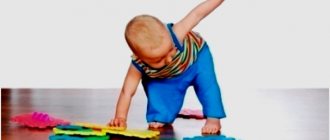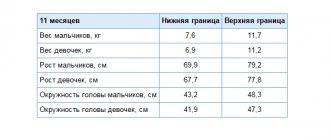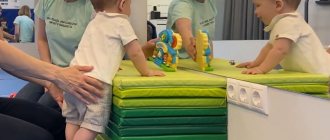One of the most important periods in a child’s life, which can have a huge impact on his further development, is the period from the first to the second year. At this time, he grows very intensively and every day acquires new skills and experience in interacting with the people around him. But, if the physiological development of a child from one year onwards has been studied quite well, then the problem of education during this period is quite acute.
Education after one year occurs simultaneously with developmental activities
Basic needs of a child in the first year of life
Developmental psychology identifies two basic groups of needs of children of this age:
- Physiological needs. The physiological needs of a one-year-old child include the need for food, water, sleep, warmth, and proper rest.
- Psychological needs. Needs for safety, emotional close communication with parents, need for knowledge of the world around us
Despite the fact that formally these groups of needs differ significantly from each other, it is quite difficult to draw clear restrictions between them. The main reason is the close relationship between them, which is formed from birth and continues throughout life.
Contact with mother is the most important thing for a child after one year
For example, feeding a child can satisfy not only a physiological need (eliminating the feeling of hunger), but also a psychological one (close contact, interaction with the mother).
Age crisis in 1 year old children: causes
Having gained independence and the opportunity to explore the world around them, kids suddenly discover that their aspirations and impulses run into the barrier of parental prohibitions. The baby wants something, and he is not yet able to understand that not everything he wants will be allowed to him. Mom will either forbid him or refuse him. In addition to this, how slow-witted these adults are sometimes! They seem to be demonstrating their readiness to help, but they do absolutely the wrong thing or give something completely different from what you ask for! But to explain it so that it finally dawns on them - well, it doesn’t work! How can you tolerate this? You need to throw a tantrum. Your baby is new to this world. And you should look at him and his actions not with irritation and impatience, but with patient wisdom, love and a desire to help.
What do psychologists say about raising a child under one year of age?
One of the most common misconceptions associated with the psychology of upbringing and development of a child over 1 year old is related to the fact that in the future the child will still not remember what happened to him at that time. This means it is not at all necessary to devote due time and attention to education.
Of course, it is unlikely that any of us will be able to remember the events that happened to us in early childhood, in particular, before the age of two. However, the period from one to two years is the very period when the first mental processes begin to take shape. The child receives the first experience in his life and the first memories of a fairly active (and not passive, as before the first year) interaction with the world around him.
One and a half year old child explores the world
Raising a child must be done from birth - this statement is beyond doubt among any modern psychologist.
Indeed, the sooner the parent begins to invest his attention and care for him, the sooner the first results will be felt. Omissions made even in the early stages can result in gaps in education, which will be very difficult to fill for many years to come.
But is it always easy to understand what exactly he is trying to convey to his parents? More often than not, even the simplest emotional reactions cause the most ambiguous reaction from his relatives.
The baby begins to be interested in communicating with peers
What should the education of a 1-2 year old child be aimed at?
- Building trust in the world and people around you.
- Development of mental processes (thinking, speech, memory, perception of colors, shapes, etc.)
- Attentive attitude to the health and nutrition of the baby.
- Development of independence and self-confidence.
- Self-care skills training.
- Formation of cognitive interest.
- Instilling the “first” rules and norms of behavior (what is “good” and what is “bad”).
- Unlocking the child's creative potential.
Crying in a child over one year old
At the age of one to two years, the child’s psychology is still such that he does not yet have the means of interaction with his parents, and his only way to attract attention is to cry. As a rule, it can indicate a complaint about a physical condition (when he has a stomach ache, an uncomfortable position in bed, etc.), and a need for attention, and frustration of some need (hunger, thirst, etc.). ).
After the first year, the child’s opportunities for interaction with parents expand somewhat. But, nevertheless, he prefers to communicate with them through simple expressions of emotion.
A child's crying is a way to express himself.
How to respond to a child's cry? Most often, parents in such situations are characterized by two unhealthy extremes: some run to calm their children down immediately, forgetting about all household chores. Others prefer to ignore his emotional manifestations, believing that in this way he is simply trying to attract attention to himself, and excessive care can spoil the child, spoiling him.
As a rule, the first point of view is adhered to by supporters of the child-centric approach. They consider close contact of a one-year-old child to be absolutely normal and natural and prefer not to limit the child’s time together. The second, more traditional approach is more rigorous. His supporters see the need to wean him from demanding his way by crying and screaming from a very early age, moving on to more mature methods of communication.
The emotional side of the issue
The emotional palette of children aged 1-2 years is still very limited.
In particular, both fatigue and dissatisfaction, along with other negative emotions, still manifest themselves in whims and crying. But if the child likes what is happening, then he begins to laugh wildly. At the same time, situations cannot be ruled out when a child’s emotions change so quickly that they simply begin to overlap each other. This also often results in shouting and noise. Therefore, parents are required to promptly console, calm and distract the child in order to help him overcome that very storm of feelings. So gradually he will learn to manage and control his emotions. Although the age of 1.5 years is not without manifestations of whims - often children begin not only to scream, but also to stomp their feet, expressing their dissatisfaction and defending their position. They also need to be responded to correctly.
How to find the golden mean in parenting? Tips for parents
- First of all, it is necessary to determine why the child is crying. Despite the fact that at this age children are really capricious, their crying can sometimes hide quite serious reasons - for example, a feeling of hunger, thirst, or illness.
- Despite the well-established belief of many that “crying is useful because it develops the lungs and stimulates the child’s breathing,” this, in any case, is a signal that the child is experiencing discomfort. This means that one way or another he needs parental help. In addition, screaming exhausts a person physically, taking away a lot of his physical resources.
- Many parents are afraid to immediately respond to their child’s crying, for fear of spoiling him. In fact, as we have indicated, it is almost impossible to spoil him before two years of age - this phenomenon begins to make itself felt closer to three years. In addition, as we have already indicated, for children of this age, screaming is, although not the only, but the main way available to them to inform their parent about what is bothering him. Of course, as the child grows up, it is necessary to explain to him that there are other ways of expressing his dissatisfaction, resentment, discomfort, etc. But first you need to learn to respond to his manifestations of emotions in the simplest form.
- Psychology warns: ignoring a child’s crying often leads to the development of various disorders, from sleep disorders to neuroses. This is why it is important to calm him down very gently and then take the measures he needs.
Mom reacts
The difficulty is that the mother does not develop the correct reaction suddenly - just as many cannot learn to give birth well the first time. The correct reaction requires training and improvement. It's easier to say what the wrong reaction looks like. If you feel that you are on the same level as your child, you feel that you are seriously beginning to resist him - this is a reaction on the same level. He says: “I won’t leave the puddle!” - you say: “You will go out of a puddle!”, and again the same thing... This is an immature reaction - seriously. If you have stepped off your parental pedestal and descended to the level of a serious dispute over whether the child will put away the cubes or not, then your reaction is immature.
Your reaction can be as hard or soft as you like, but it should always be a little on top. You must understand who you are dealing with. But for a mother, staying at home with a child of primary preschool age and the lack of adult communication seriously changes the scale. And dad, returning in the evening, may find serious bickering over some issue such as cubes or pajamas. Provoked all day, mother begins to be stubborn about all these reasons in the evening.
You must learn not to lose scale
Compared to the world revolution, it doesn’t matter what kind of pajamas you wear. If you seriously start to get angry, then it is better to try to move away or withdraw your demand
And this does not mean that you follow the child’s lead. Remember: this is a small child who is not responsible for himself, although it seems that his behavior is malicious, purposeful, specifically against you.
And a child under seven years old is actually not responsible for himself. Although the degree of non-response is one for a two-year-old, it is different for a five-year-old. A two-year-old is not responsible for himself at all; a five-year-old can already demand something. But overall, you are still responsible for everything. It's hard. Therefore, you should have five to seven ways in your arsenal to “resolve” the regime situation - force them to remove, for example, the cubes. Methods that you no longer think about, proven, effective - because the child will have difficulties with all the routine moments until they are mastered, and up to three years of age this is completely normal.
The simplest thing is a system of rewards for the child. (Punishments don't work, and if they do work, they don't work for very long. Spanking and yelling are generally not good.) For example, the child needs to know that when he completes the blocks, you will do something nice. An action that requires tension (and clearing blocks is an action that requires tension) must be followed by something that brings obvious pleasure. Except for candies and cartoons. If this is the only incentive in your arsenal, then it is very little.
Nurturing a child's independence up to one year old
Another issue that causes a lot of controversy among supporters of various approaches to education is related to the development in an infant of such a quality as independence. At what age should a child sleep separately from his parents?
Teaching your baby to be independent
Just like on the issue of children's crying, opinions on raising a child's independence are also divided. And if some psychologists insist that even after a year the child should be practically inseparable from his mother (and close contact will compensate for the stress received at birth), others insist that the sooner the child becomes autonomous from his parents, the better this will affect on its development in the future.
And raising any child from 1 to 2 years old cannot do without developing his independence and autonomy.
At 2 years old, children can organize independent play
And although each of these approaches is justified in its own way, the criterion for the correctness or incorrectness of upbringing can only be the condition of the child himself. What do psychologists themselves advise in such a situation?
- Parents who pay a lot of attention to their child under two years old do not risk raising an insecure and fearful person. Interest in the people around you and curiosity are precisely those qualities that can only be cultivated in a psychologically favorable and comfortable environment.
- Research has confirmed that parents who spend a sufficient amount of time with children under two years of age help them develop such qualities as sociability, empathy (the ability to understand the mood of another person), and emotional sensitivity. This is achieved due to the fact that communication with parents is the first and, undoubtedly, invaluable experience of interacting with people.
- When communicating with a child, there is no need to strive to do all the work for him, overly patronizing him. Parents who abuse this deprive the child of independent experience of activity.
- You need to gradually accustom a child under two years old to sleep independently. If the child experiences difficulties and is capricious at first, and also shows signs of anxiety and fear, you should not transfer him to the parent’s room. It is enough just to sit near his bed for a while and calm the child to rest. But this should not be done immediately, but gradually.
The 3-year crisis may begin much earlier
Potty training
Potty training should begin at 1.5–2 years. But it must be taken into account that the development of physiological processes in children is uneven. There is no need to worry about this, gradually every baby will develop the habit of going to the toilet, it just takes longer for some.
What not to do when potty training:
- It is impossible to force. It is impossible to ensure that the child asks to go to the potty every time he wants to go to the toilet. You need to come to terms with the fact that at first he will be forgotten.
- Start training ahead of time. No matter how much parents would like to teach their child to go potty early, children under 1.5 years old are simply not capable of this. Most children master the potty by age 2.
- Move the pot far away. The baby should be able to use the potty without adult help.
- Use diapers at home. Sure, diapers are convenient and save a lot of cleanup and laundry, but wearing diapers all the time will bother your baby.
- Scold the baby, demanding obedience. Most modern potties have a variety of designs that are attractive to children. They are made in the form of toys, bright and beautiful - children are interested in using them.
- Distract your child when he is busy. If the child does not show a visible desire to go to the toilet, there is no need to tear him away from the game and force him to sit on the potty.
What skills should a child develop by the first year?
Developmental psychology states that raising a child between one and two years of age should ensure the development of the following skills:
- Independent movement around the apartment.
- Isolating in the space around him objects that are of greater interest to him, people who are more pleasant for him to communicate with.
- Development of autonomy and independence from parents.
- The first manifestations of curiosity and interest in the world around us.
- Gaining experience in the first types of independent activities.
Joint activities are the best way to educate.
By the age of two, the child becomes even more active and inquisitive. His cognitive processes develop and the first rudiments of character begin to make themselves known. It is very important that at this time he feels full support from his parents and other people significant to him.
Subscribe
Detki.guru on Telegram
Leave a comment
Characteristics of the age period
When a child turns one month old, parents notice significant changes in his skills and behavior:
- shows independence;
- speaks the first words;
- walks, runs;
- studies surrounding objects with interest.
The baby’s activities are aimed at learning objective functions and tasks. He copies the actions of his parents, imitating their behavior. It is necessary to voice the manipulations that an adult performs. It is important to spend time together: stacking cubes, looking at pictures in books.
By the way! In the first three years of life, the baby goes through half the path of mental development.
Raising children over the age of one year requires reflection and understanding of children's actions. The baby begins to understand how to interact with objects, comparing his endeavors with those of his parents.
The period is characterized by the beginning of the formation of personal qualities: self-esteem, self-esteem, self-awareness. Children's speech is rapidly developing and their vocabulary is expanding.
A good way to monitor a child’s skills is to create a development calendar where the child’s acquired skills are recorded.
There are a number of critical points that serve as guidelines for adults. If the child is in
- 1 year and 4 months does not understand the purpose of household items;
- 1 year and 2 months does not imitate the actions of others;
- 1 and 6 months the baby cannot walk;
- 1 year and 5 months pronounces less than 15 lexical units;
- I haven’t learned how to write sentences for 2 years.
The physical and intellectual characteristics of each baby are individual, so the pace of development is different.
Development of children in the first year of life.
Features of child development from birth to one year.
The article is written on the basis of special literature (links are provided at the end), based on the results of psychological and neuropsychological studies of children in the first year of life.
There is a lot of information about the nutrition and care of a child in the first year of life, but often parents do not know, or use unreliable information about the mental development of a child in the first year of life. The development of a baby occurs very intensively
and adults need to know the basic patterns.
The mental development of a child during the 1st year of life largely determines his further development. For the normal development of a baby
, it is necessary that he receives a sufficient number of signals from each analyzer - light for the visual, sound for the auditory, touch and stroking for the tactile.
The insufficiency of these signals, especially stroking and the mother's voice, in the first days and weeks of life can lead to disturbances in the mental and emotional development of the child, which will manifest themselves at an older age. Let's start with the period of intrauterine (prenatal period) development of the child.
Already a two-month-old embryo is able to respond to touch.
By the end of the third month of pregnancy, muscle activity appears, the embryo tries to take the most optimal position. By the end of the fourth, the embryo is already making active movements. From the 24th week, the child (fetus) hears sounds coming from outside. But the main sound for him is the beating of his mother’s heart. If the mother's heart rhythm does not change, then the child feels safe. Therefore, mood swings, anxiety, and worries of a pregnant mother can have a bad effect on the fetus. But short-term stressful situations cause little or no harm. But prolonged and severe emotional stress has a bad effect. During the prenatal period, the child hears loud external sounds coming to him through the mother's abdominal wall. But he hears his mother’s voice from within, because... it comes to him through the diaphragm. Therefore, it is the mother’s voice that is most preferred by newborn children and in subsequent months. Hearing
A child is born with hearing.
But newborns are less sensitive to quiet sounds than adults. As noted above, children perceive sounds even in the prenatal period. But the perception of them in the womb is different from the perception after birth. American psychologist Anthony De Kasper discovered that infants prefer their mother's voice to the voices of other people, incl. and my father's voice. De Kasper hypothesized that the baby better perceives a voice that is familiar from the prenatal period. This hypothesis has been tested by research. Mothers, starting from the 7th month of pregnancy, read a short poem written in a certain meter. They read it every day for ten minutes. Then the newborns were given the same poem to listen to, as well as others that had a different meter. It was found that they distinguished familiar (based on poetic rhythm) verses from unfamiliar ones. Children who were not read the same poem during pregnancy did not respond to differences in the rhythms of the poems. In another study by E. De Kasper, expectant fathers talked to their children in the womb every day. When newborns were given a recording of their father's voice, the voice of strangers, and their mother's voice, the preferred voice was the mother's. This is explained by the fact that the perception of the father's voice during the prenatal period occurs differently than the mother's voice. The father's voice comes from outside, and the mother's voice is perceived in utero. Another reason is that the range of women's voices is more preferable to newborns than deep male voices. It is not for nothing that adults, when communicating with babies, speak in a high voice, intuitively and in practice realizing that this is better. The baby's reaction to a high voice is more positive than to a low one. A few months after birth, babies distinguish between the voices of their mother and father and distinguish them from the voices of other people.
A myth about the development of young children is associated with a child’s hearing.
It's called the "Mozart effect." Its content is that if a child is allowed to listen to classical music, and especially Mozart, at an early age and even in the prenatal period, this will contribute to his high intellectual development. The myth was so convincing that in the 70s of the last century, the governor of one of the American states gave all families who gave birth to children that year a disk with classical music. This myth is still supported by various kinds of popular literature or various theories that do not have any research basis. This myth is also attractive because of the simplicity of its implementation. But this myth is not very harmful. It is useful for a child to listen to music. You just need to notice what kind of music he likes and what he doesn’t. And if the mother hums something, then this has a beneficial effect on the child in the first year of life. But what is very important! Hearing develops before speech. Gradually, the child learns to correlate perceived sounds with the articulation that corresponds to them. Therefore, speech formation occurs only in the process of communication between the child and surrounding adults. It makes no sense to read books to children in their first year of life, but it is very important to communicate with them and talk.
Vision
Vision is the least developed sense in newborns. However, the part of the brain responsible for vision develops very quickly. If immediately after birth a child can only distinguish some colors, large objects and follow a moving large object, then already at 6 months he directs his gaze to where the adult is looking. By the end of the first year, a child’s visual acuity reaches 90% of an adult’s visual acuity. An interesting experiment was conducted by American psychologists E. Blass and K. Camp with two-month-old babies. The children could observe a woman they did not know, dressed in a white robe and with a scarf on her head, for some time. Then this woman left the room, and a minute later either she again or another woman dressed in the same way entered the room. It turned out that the babies looked at the new woman’s face longer than at the familiar one. The experiment showed that two-month-old babies can already remember and distinguish human faces. Already two-month-old babies begin to distinguish between people and inanimate objects. They smile at people, they can respond to sounds, but they can only reach out to objects. The following experiment was conducted with four-month-old infants. Before their eyes, people hid behind the screen and then appeared. In this case, the infants made sounds in the direction of this screen. But when an object was hidden behind a screen, they only gravitated towards it. The infants confidently distinguished between a person and an inanimate object. From 6 months, children can follow their mother's gaze when turning her head. Around the first year of life, they are already able to respond only to the direction of their mother’s gaze, even if she does not turn her head.
Between 9 and 14 months, babies can point to different objects. But they indicate only to a person, and not to an inanimate object. Before pointing, the child looks at the adult, checking whether he is looking at him. And then, when indicated, he controls whether the adult looked at the object indicated to him. Thus, children of the first year of life behave differently with living and inanimate objects. They have different expectations of people and things
.
Children quickly learn to distinguish whether an adult experiences positive or negative emotions when looking at something. This is how they take their first steps in being able to discern the opinions of others. For example, a child will avoid an object to which the parents reacted negatively. In experiments by psychologist J. Sours, children as young as one year old were given an image of a cliff in their path using a projector. If the mother showed a frightened expression on her face, then none of the children crossed this cliff. But if the mother showed joy, then 74% of the children continued to move, without fear of this cliff.
Summary:
Children of the first year of life, from the age of 2 months, are quite capable of visually perceiving their surroundings, especially close adults, their facial expressions.
Therefore, visual stimuli are necessary for the normal development of a child. The emotions of the adults around the child are especially important. After all, children in the first year of life perceive the world around them through the perception of the adults around them, primarily their parents, their facial expressions and emotions. Separately about the smile of a child in the first year of life.
Most often, adults notice a child’s smile around 2–3 months.
But in fact, it appears much earlier. Movements of the facial muscles in newborns, similar to a smile, appear from 2 to 12 hours after birth. They occur during sleep and are reflexive in nature. A clear smile appears immediately around the third week. It is evoked by the sounds of a human voice in the female range. But in the fifth week, the voice stops making the baby smile. He begins to respond to the voice not with a smile, but with sounds. In the fifth week, a smile can be caused by some visual stimuli, incl. and people's faces. Between about 2 and 3 months, babies begin to respond with a smile to human faces. The child begins to smile not reflexively, but consciously.
Moreover, he very quickly learns to distinguish the faces of familiar and unfamiliar people. At three months, babies easily distinguish their mother's face from other women, even those who look like her.
At the fourth or fifth month, children begin to visually distinguish their mother from other adults. They smile less at strangers than in response to their mother's face and other familiar faces. At the age of 4 to 6 months, children prefer to look at joyful, smiling faces, reacting to them with a smile.
Gradually, a child’s smile becomes an important means of communication, an indicator of the desire to establish contact, a positive response to the world around him, primarily to close adults.
And one more meaning of children's smiles. Mothers and other adults rate smiling children's attractiveness higher. Such children show a greater desire to play with them, talk, and interact. But the smile of children largely depends on the adults around them.
Motor skills, motor development
A baby's development is very rapid. A very important period is from birth to 3 months. In the first week, the baby undergoes “tuning” of important functions - breathing, the functioning of the cardiovascular system and the digestive system. At this time, infants still react weakly to signals from the external environment. But by the end of the first month of life, the brain and neck muscles develop so much that the baby is able to raise his head while lying on his stomach. Below are approximate dates for the development of basic motor skills in children in the first year of life.
Psychomotor development of children in the first year of life.
Skill Month when 50% of children acquire it Month when 90% of children acquire it Raises head 90 degrees while lying on stomach 2.2 3.2 Rolls over 2.8 4.7 Sits without support 5.5 7.8 Stands with support 5.8 10.0 Crawls 7.0 9.0 Walks with support 9.2 12.7 Does not stand for long without support 9.8 13.0 Stands well without support 11.5 13.9 Walks well 12.1 14.3 The child’s gradual mastery of motor skills gives impetus to his development, because
increase the overview of the surrounding space and the number of external stimuli and make the child’s perception of the surrounding world arbitrary and purposeful. Independent movement is very important in the development of a child in the first year of life. With its help, the child learns to use spatial references, to sense that other objects change their location when the child himself moves. All this contributes to the development of sensory and motor parts of the brain. Therefore, it is important to give the child the opportunity to crawl, sit, and walk. It is important that he has independence in movement. Grasping reflex.
The grasping reflex is one of the innate ones in a newborn.
But at first it is just poorly coordinated attempts to strike visible objects. By the end of the second month, it even begins to fade away; the child makes less and less attempts to achieve any object. But by three months the ability to grasp objects increases sharply. And as soon as at 4-5 months the child learns to sit, he begins to grab objects with both hands, feel them, and put them in his mouth. Important.
The child should have this opportunity.
Through grasping and palpating, development occurs, the child learns to understand the world around him, and certain parts of the brain develop. Upon reaching 6 months, the exploration of objects with the help of fingers improves. By the end of the first year of life, the thumb and index fingers begin to be used for grasping. IMPORTANT!
As soon as a child begins to reach and grab objects, crawl, and then walk, the life of the parents becomes more complicated.
There is a need to monitor it in order to maintain the safety and security of things in the house. But activity is necessary for a child, it is natural for him, through it he learns about the world around him. By the way, through crawling and running, children also learn caution. A child who has learned to walk and runs independently around the apartment can step, for example, from the sofa when he is supported. But when he is alone, he will carefully slide off this sofa. The more freedom a child has in his movements, the better this affects his development. About the early development of children.
Nowadays various
methods of early childhood development are very popular.
Many parents try to find special ways for the development of their child, and they begin to do this already during pregnancy. The market willingly meets them halfway, offering various miraculous methods for the early development of children. In most cases, these methods are not based on scientific data, although their authors manipulate words: brain development, neural networks, synchronization of brain function, etc. Moreover, they can sometimes lead to developmental disorders. As in the case when “advanced” parents, from the age of 3 months, read books to their daughter, played different music for her, spoke to her in English, etc. and as a result, the girl began to speak only at 3 years old and has many developmental disorders in the emotional and volitional sphere.
But the formation of different parts of the brain obeys biological laws, and the pace of development is individual - some are faster, others are slower .
During the first year of life, sensory systems develop. And the development of each new function, the mastery of each new skill appears in a certain period. If a skill is not sufficiently formed, then the subsequent one is also formed distortedly, and its underdevelopment occurs.
There is not much that children need in the first year of their life: communication with loving adults, primarily with their mother, the opportunity to explore the world around them without special restrictions through hearing, vision, movement, and tactile sensations.
It is extremely important for the mental development of a child in the first year of life to have positive emotional contact with the adults around him, primarily with his mother.
The weak expression of the mother's positive emotions towards the child is a significant risk factor affecting its development, including the development of intelligence.
In conclusion, we present the words of a leading specialist in child physiology and psychology.
“Our task at the stage of preschool childhood is not to rush, not to demand from the child what is not yet available, but to develop speech, movements, emotions, to give the child opportunities for creativity, and not to train him like a monkey.”
Maryana Bezrukikh. Director of the Institute of Developmental Physiology of the Russian Academy of Education, academician of the Russian Academy of Education, Doctor of Biological Sciences.
Sources: 1. A. V. Dozortseva, G. A. Vilenskaya, T. B. Ryazanova... “Twins from birth to three years” 2. Zh.M Glozman. “Neuropsychology of childhood” 3. E.A. Sergienko, E.I. Lebedeva, O.A. Prusakova “The mental model as the basis for the formation of understanding of oneself and another in human ontogenesis.” Publishing house Institute of Psychology RAS Moscow - 2009 4. E.A Sergienko. "Early Cognitive Development: A New Look." - M.: Publishing house. IP RAS 5. D. Shaffer “Children and adolescents. Developmental Psychology". 6. K.E. Izard “Psychology of Emotions”
Peculiarities of child mental development
At this age, children may exhibit qualities that their parents do not like. Unfamiliar with the peculiarities of the stages of development of a small person, parents perceive their behavior as whims. At the age of 12 months and older, the baby may behave:
- willfully, that is, the child tries to carry out a certain plan or intention;
- obstinately; he shows stubbornness and protest against any rules of behavior;
- despotic - dictates one’s behavior to parents, tries to dominate others; the strength of manifestations of these qualities may vary;
- protest and quarrel with parents, conflict with them.
Masaru Ibuka technique
Masaru Ibuka is a Japanese engineer and successful businessman, one of the founders. However, he gained fame to a greater extent as the author of a unique method of early development, which combines recommendations regarding all aspects of a child’s life. Masaru Ibuka's only son, who suffered from autism, inspired him to study in detail a variety of pedagogical techniques and constantly observe children and adolescents. The result of the research was a provocative conclusion, which became the title of a famous book - “After Three It’s Too Late”
Masaru Ibuka was convinced that in the first three years of life a child’s mental abilities are formed, which means it is important for parents not to miss this “golden time” for educating their child
Basic principles of the methodology:
The first three years of a child’s life are the foundation for his entire future.
Therefore, it is important to provide the baby with a favorable environment, constantly communicate with him, show affection and care, develop him intellectually and physically, aesthetically and musically. The environment is more important in terms of a child’s development than genes. It is impossible to “overfeed” a child with new knowledge; his nervous system blocks information when the brain is full of it. It is necessary to introduce a child to real art by showing him reproductions of paintings by great artists and letting him listen to the music of classical composers. A child should not have many toys, this distracts attention and suppresses development. Strictness towards a child should be shown in the first years of his life, and not vice versa. After 2-3 years, the child develops self-esteem, and excessive pressure only causes protest and disobedience. Young children can and should be taught foreign languages. Parents should encourage their child's creative expressions. Children need to constantly move. Motor skills need to be trained from infancy.
Walking is very beneficial because it uses most of the muscles in the body.
Why is it useful to help parents?
Homework is necessary not only for developing abilities, but also for teaching discipline. Many people think that in the first year it is too early to “load” the baby. Not only is it possible, but it is also necessary. For example, ask him to bring something or arrange toys.
The child will be happy to help. Over time, you can entrust more complex work.
The basic rule is that the request should be formulated by explaining specifically and precisely where the item should be taken.
Remember that a child cannot retain information in full, so each instruction should mean one action. Early “labor education” develops memory and attention, during which children remember and perform certain duties.
Seven months
During the period from 7 to 9 months, the child develops so actively that parents can notice changes almost every day. This is no longer the same baby who only slept, ate and cried. By seven months, the baby begins to move more, try new foods, and learn new skills. Parents should approach raising a 7-month-old child individually.
Don't compare your child with others and worry. Some children already begin to take their first steps by 9 months, and some have just learned to sit up on their own at 8 months. If you have doubts about the correct development of the child, it is best to contact a pediatrician or neurologist.
What can a 7-9 month old baby do?
- By 7 months, the baby has fully developed vision and hearing. The baby can clearly see objects that move quickly, begins to recognize relatives, and is surprised at the sight of previously unfamiliar objects. The baby already reacts well to quiet sounds and understands when someone addresses him;
- The child's muscles become stronger, he can already sit and crawl confidently. However, not all children crawl; some skip this stage and immediately begin to walk. At the age of 8-9 months, most children can stand at a support and take steps along it;
- Most children have their first teeth by 7 months, and more teeth by 9 months. However, parents should not worry if by 8-9 months the child has not yet acquired the first tooth; the absence of teeth up to a year is considered normal;
- The child already has good control over the movement of his arms and legs and understands that with their help he can reach out and take the desired object. The baby can hold toys of various shapes in his hands, rearrange objects, study them for a long time, open and close them, consciously throw them on the floor;
- At the age of 7-9 months, the child is actively developing speech, he is already trying to communicate with his parents using the speech organs. The baby learns to pronounce sounds and individual syllables, change intonation, babbling becomes more expressive;
- A child of 7-9 months distinguishes when he is praised and when he is scolded, he knows his name and the names of loved ones very well. During the game, the baby already understands that the hidden thing has not disappeared, but is simply not visible to him. During this period, the child is most attached to his mother, and begins to be afraid of strangers;
- By 7 months, as a rule, the child tries new foods. He already opens his mouth while eating, removes food from the spoon with his lips, and can hold a bottle or sippy cup on his own. If the bottle falls and is within the child's reach, he can pick it up on his own.










